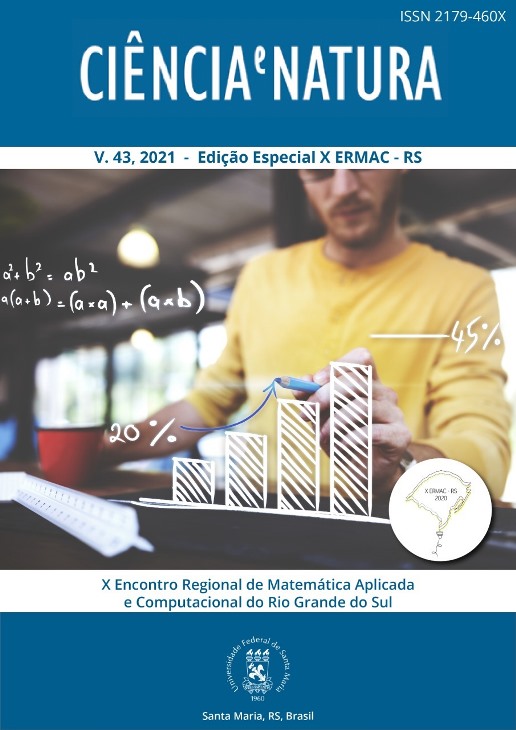Necessidade de leitos hospitalares para Covid-19 estimada por modelo epidemiológico SEIR adaptado para o município de Pelotas
DOI:
https://doi.org/10.5902/2179460X66940Palavras-chave:
Projeção de leitos hospitalares, Covid-19, SEIR, Modelo estocásticoResumo
Um dos desafios causados pela pandemia da covid-19 foi o provimento de leitos hospitalares para enfrentamento da doença e para evitar sobrecarga do sistema de saúde. Este artigo tem como objetivo apresentar a plataforma de projeção de leitos hospitalares desenhada para auxiliar a prefeitura do município de Pelotas, Rio Grande do Sul, a definir o número máximo de leitos de UTI necessário no pico da epidemia no município. Empregou-se o modelo epidemiológico SEIR adaptado com processo estocástico para os parâmetros da dinâmica de transmissão. A plataforma foi construída dentro de uma Aplicação Shiny e permite ao usuário ajustar todos os parâmetros utilizados no modelo. No início de abril de 2020, estimou-se a necessidade de 100 leitos de UTI no pico da epidemia em Pelotas. Tanto os parâmetros do modelo quanto as previsões foram constantemente atualizadas conforme o avanço da epidemia e do conhecimento científico sobre a doença. A plataforma foi uma das ferramentas utilizadas pela Equipe Científica do Comitê Interno para Acompanhamento da Evolução da Pandemia pelo Coronavírus da UFPel para tomada de decisões e divulgação de notas técnicas à imprensa.
Downloads
Referências
CHANG, W., CHENG J., ALLAIRE J., XIE, Y., MCPHERSON, J.. (2020). Shiny: Web Application Framework for R. Disponível em: https://cran.r-project.org/web/packages/shiny/index.html. Acesso em: 4 de abr . 2020.
EKER, S. Validity and usefulness of COVID-19 models. Humanities and Social Sciences Communications 7(54), 2020.
HALLAL, P. C., BARROS, F. C., SILVEIRA, M. F., BARROS, A. J. D., DELLAGOSTIN, O. A., PELLANDA, L. C., STRUCHINER, C. J., BURATTINI, M. N., HARTWIG, F. P., MENEZES, A. M. B., HORTA, B. L., VICTORA, C. G. EPICOVID19 protocol: repeated serological surveys on SARS-CoV-2 antibodies in Brazil. Ciênc. saúde coletiva 25(9), 2020.
INSTITUTO BRASILEIRO DE GEOGRAFIA E ESTATÍSTICA (IBGE). Cidades e Estados. Pelotas. Disponível em https://www.ibge.gov.br/cidades-e-estados/rs/pelotas.html. Acesso em: 4 de abr . 2020.
JEWELL, N. P., LEWNARD, J. A., JEWELL, B. L. Predictive Mathematical Models of the COVID-19 Pandemic: Underlying Principles and Value of Projections. JAMA 323(19): 1893-1894, 2020.
RAINISCH, G., UNDURRAGA, E. A., CHOWELL, G. A dynamic modeling tool for estimating healthcare demand from the COVID19 epidemic and evaluating population- wide interventions. Int J Infect Dis 96: 376-383, 2020.
SANTOS, T. M., CATA-PRETA, B. O., ARROYAVE, L., NUNES, B., CROCHEMORE, I., COLLARES, T., BUSKE, D., GONÇALVES, G., QUADROS, R., GANDRA, T., FASSA, A. G. COVID-19: Projeção de necessidade de leitos. Disponível em: https://dms-p2k.ufpel.edu.br/corona-leitos/index.html. Acesso em: 10 de jun. 2020.
WORLDOMETER. COVID-19 Coronavirus Update. Disponível em: https://www.worldometers.info/coronavirus/%. Acesso em: 17 de ju. 2021.
Downloads
Publicado
Versões
- 2022-04-06 (2)
- 2021-11-08 (1)
Como Citar
Edição
Seção
Licença
Copyright (c) 2021 Ciência e Natura

Este trabalho está licenciado sob uma licença Creative Commons Attribution-NonCommercial-ShareAlike 4.0 International License.
Para acessar a DECLARAÇÃO DE ORIGINALIDADE E EXCLUSIVIDADE E CESSÃO DE DIREITOS AUTORAIS clique aqui.
Diretrizes Éticas para Publicação de Revistas
A revista Ciência e Natura está empenhada em garantir a ética na publicação e na qualidade dos artigos.
A conformidade com padrões de comportamento ético é, portanto, esperada de todas as partes envolvidas: Autores, Editores e Revisores.
Em particular,
Autores: Os Autores devem apresentar uma discussão objetiva sobre a importância do trabalho de pesquisa, bem como detalhes e referências suficientes para permitir que outros reproduzam as experiências. Declarações fraudulentas ou intencionalmente incorretas constituem comportamento antiético e são inaceitáveis. Artigos de Revisão também devem ser objetivos, abrangentes e relatos precisos do estado da arte. Os Autores devem assegurar que seu trabalho é uma obra totalmente original, e se o trabalho e / ou palavras de outros têm sido utilizadas, isso tem sido devidamente reconhecido. O plágio em todas as suas formas constitui um comportamento publicitário não ético e é inaceitável. Submeter o mesmo manuscrito a mais de um jornal simultaneamente constitui um comportamento publicitário não ético e é inaceitável. Os Autores não devem submeter artigos que descrevam essencialmente a mesma pesquisa a mais de uma revista. O Autor correspondente deve garantir que haja um consenso total de todos os Co-autores na aprovação da versão final do artigo e sua submissão para publicação.
Editores: Os Editores devem avaliar manuscritos exclusivamente com base no seu mérito acadêmico. Um Editor não deve usar informações não publicadas na própria pesquisa do Editor sem o consentimento expresso por escrito do Autor. Os Editores devem tomar medidas de resposta razoável quando tiverem sido apresentadas queixas éticas relativas a um manuscrito submetido ou publicado.
Revisores: Todos os manuscritos recebidos para revisão devem ser tratados como documentos confidenciais. As informações ou ideias privilegiadas obtidas através da análise por pares devem ser mantidas confidenciais e não utilizadas para vantagens pessoais. As revisões devem ser conduzidas objetivamente e as observações devem ser formuladas claramente com argumentos de apoio, de modo que os Autores possam usá-los para melhorar o artigo. Qualquer Revisor selecionado que se sinta desqualificado para rever a pesquisa relatada em um manuscrito ou sabe que sua rápida revisão será impossível deve notificar o Editor e desculpar-se do processo de revisão. Os Revisores não devem considerar manuscritos nos quais tenham conflitos de interesse resultantes de relacionamentos ou conexões competitivas, colaborativas ou outras conexões com qualquer dos autores, empresas ou instituições conectadas aos documentos.






